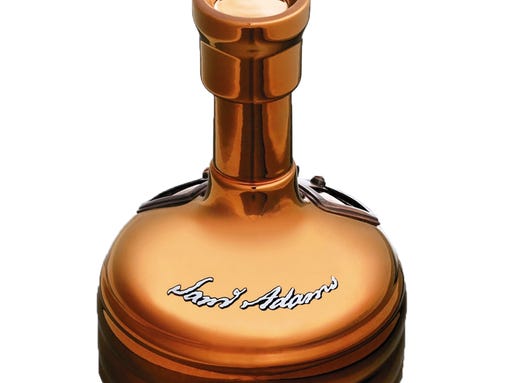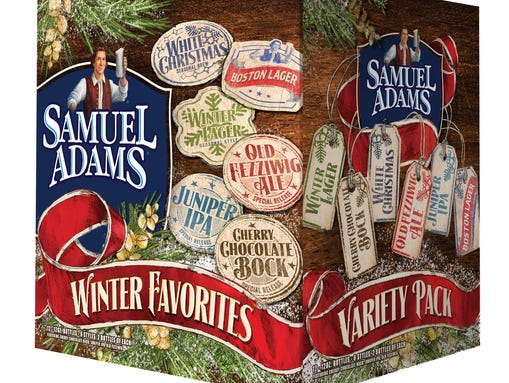Bored with Budweiser? Crack open a new vanilla bourbon-flavored lager from the market leader's "Project 12" limited edition 12-pack, which debuted Monday and is available through the end of the year. Other twists on the traditional Budweiser lager within the pack (four bottles each of the three flavors): a darker, slightly stronger brew and a hoppier one made with Pacific Northwest hops.
Or if you prefer holiday spices, Blue Moon Brewing, which is owned by competitor MillerCoors, has a new Gingerbread Spiced Ale in its brewmasters winter sampler pack, out Saturday. ..
Seasonal and limited-edition beers are not new, but, typically, smaller, independent craft breweries have been the ones more likely to release them. Boston Beer Co., the largest U.S. craft brewery, has its own gingerbread-flavored beer, the Merry Maker stout, in individual 22 oz. bottles, and the cinnamon, ginger and orange peel-infused Winter Lager, in six packs and a winter variety pack, on the way to stores now.. Also just out, the brewery's Utopia, a blended and barrel-aged "extreme" (read: very high alcohol) beer -- only 12,000 bottles were made and each sells for $199.
Also just hitting retail from regional breweries are a new Accumulation White India Pale Ale from New Belgium Brewing Co. (Fort Collins, Colo.) and a Blackout Stout and Christmas Ale from Great Lakes Brewing Co. (Cleveland).

Boston Beer Co. is releasing only 12,000 bottles of its $199 Samuel Adams Utopia, an annual specialty release that is a unique blend of barrel-aged beers, some aged for nearly two decades.(Photo: Boston Beer Co.)
The growing inclination of big brewers! to follow suit suggests that mega-brewers are taking notice of the successful inroads that craft breweries have made in the marketplace. While major brands dominate beer sales, craft beer accounted for 8.5% of the $62 billion spent on beer at retail in 2012, according to market tracking firm Technomic. That's up from 7.5% in 2011.
That growth has not gone unnoticed by big brewers. "They want to play in the craft space ... (because) they think that consumers, particularly Millennials, are looking for new flavors and new brands," says Eric Shepard, vice president and executive editor of Beer Marketer's Insights.
The top 20 beer brands have seen their market share remain basically flat -- up 0.7% in 2012 -- while all other brands combined rose 3.5%, the firm found. Big brewers also failed to capitalize on premium and high-end trends explored readily by wine and spirits makers, Shepard says. "So you have this double push for them to explore the craft space with their own brands."
This is the second year for Budweiser's Project 12, which lets brewmasters from its dozen U.S. breweries collaborate and tinker with new recipes based on the original. While last year's batch resulted in the more full-bodied Budweiser Black Crown being added to the company's year-round lineup, that's not necessarily the plan this year, Budweiser Vice President Brian Perkins says.
And, he says, "we will never pretend to be a craft beer. (With Project 12), it is really about emphasizing the skills and versatility of our brewmasters and how high quality Budweiser is."
Founded in 1995, Blue Moon experimented with flavors, among them a pumpkin beer, beyond its White Belgian Ale flagship, but discontinued them after a few years to focus on the original. Eventually, consumers began contacting the company about the old flavors.
These days, Blue Moon has 18 additional beers that it releases seasonally or for a limited time. "Compared to back then, it's almost like night and day," brewery founder Keith Vi! lla says.! "People are more accepting of different flavors of beer. People are really taking advantage of the Internet and delving in and finding out what these beers are all about."
Blue Moon let fans vote on Facebook for ingredients to be used in a seasonal beer, and Gingerbread Spiced Ale was the result. As for supplies of the limited seasonal, Villa says, "when it's gone, it's gone."
Coors plans a new seasonal citrus light beer next year, and Miller has released Third Shift Amber Lager, created by some of its experimenting brewers. Also in the works is Fortune, a higher alcohol lager. Meanwhile, Anheuser-Busch has its Shock Top brand of three fruit-infused beers and an apple-wheat cider; it also owns Goose Island Beer Co., which just expanded its Vintage Collection of beers barrel-aged with fruit ingredients: the farmhouse ales called Gillian (strawberry, honey and pepper) and Halia (peaches), and 2013 editions of the Lolita (blackberry) and Juliet (raspberry) sour beers.
Craft breweries have grown protective of their turf and are concerned that big brewers may mislead consumers with offshoot product lines and brands -- and unfairly gain growth by using their vast distribution power. The Brewers Association, which conducts the annual Great American Beer Festival in Denver, has proposed that all beers have the parent company name on the label.
Without some transparency "craft beer made by craft brewers may soon be hijacked" just as "homemade" foodstuffs have been by mass-produced supermarket commodities, association president and founder Charlie Papazian wrote recently in The New Brewer magazine.

Samuel Adams' winter favorites sampler 12-pack includes Samuel Adams Winter Lager and Old Fezziwig, both which contain ci! nnamon, g! inger and orange peel, as well as a Cherry Chocolate bock beer, a Juniper India Pale Ale and an unfiltered White Christmas ale.(Photo: Boston Beer Co.)
That's a move that Jim Koch, founder of the Boston Beer Co., and maker of Samuel Adams beers, approves of. "I say, 'We welcome you' and we would hope that you would be proud to put your own name on that (beer),' " he says.
Koch, who recently became the first craft brewer to become a billionaire, himself took flak from craft brewers in the company's early years for initially brewing Samuel Adams Boston Lager under contract at other breweries. That consumers might try big brewers' specialty beers is all part of "this flavor revolution," he says.
"Once you've discovered beer with a lot of flavor it's hard to forget about it," Koch says. "Our drinkers will have a Bud Light, Coors Light or a Miller Lite and they are fine with it. We all eat at really good restaurants and we all occasionally eat at Taco Bell. And they are both good. It's great that the American consumer has choice."
No comments:
Post a Comment